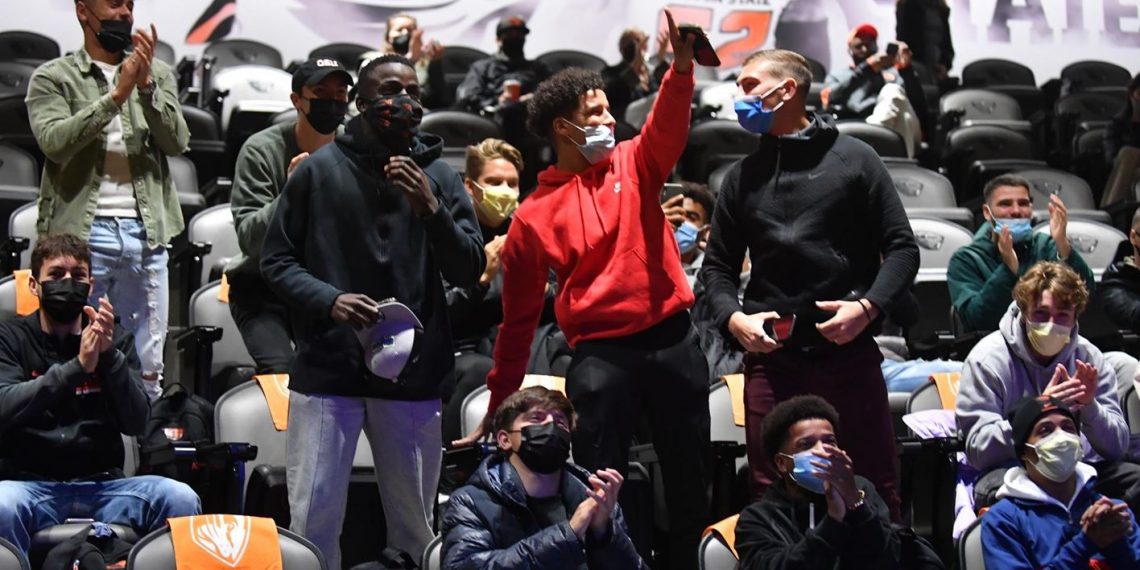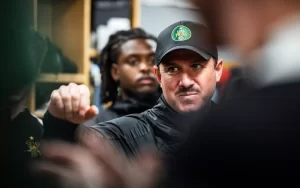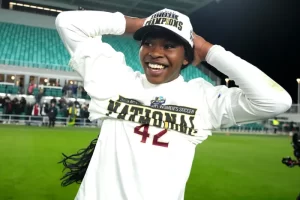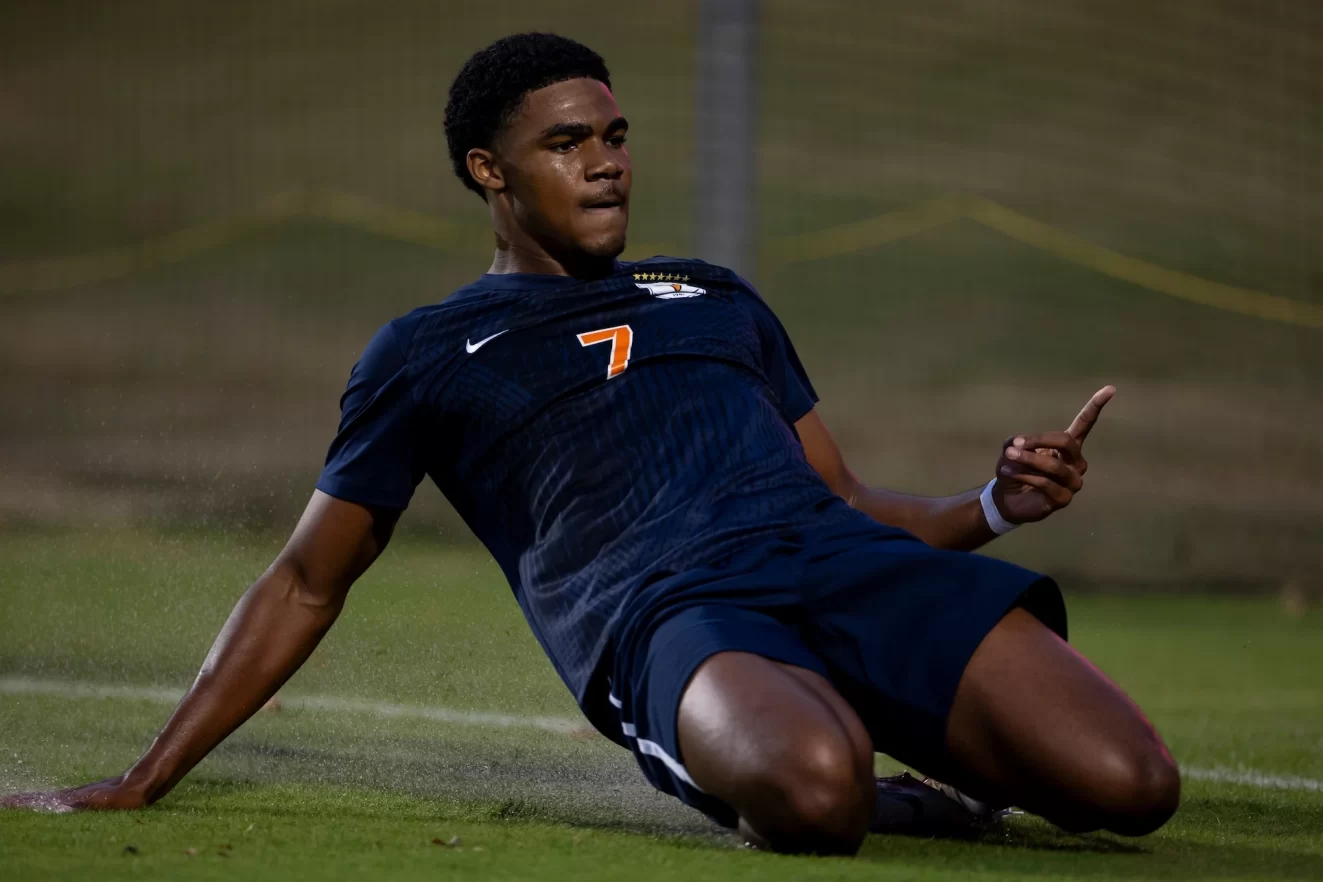Eight Teams Left Standing With A Ticket To The College Cup On The Line. There Are No Easy Wins At This Point.
Clemson (15-5-0) at Oregon State (14-2-3) – Saturday 9 p.m. EST –
This one is a “something has to give” collision between two very good soccer teams. Clemson under head coach Mike Noonan has a storied history that includes 16 trips to the Elite Eight. Oregon State under Terry Boss is making its first appearance in the Elite Eight.
Despite the historical differences, these teams have a lot in common this year. Both have had seasons in which they have had to make adjustments on the offensive side of the ball due to key early season injuries.
Both had disappointing 2020 NCAA Tournaments. Clemson, the number one seed in 2020, unexpectedly fell to Marshall in the Sweet Sixteen in a contest that was determined by a penalty kick shootout. Oregon State lost to Virginia Tech 2-1 in overtime in the first round of the 2020 NCAA Tourney.
Both come into the Sweet Sixteen off of difficult physical matches. Clemson topped Kentucky 2-1 with midfielder Alvaro Gomez scoring the game-winning goal in the 89th minute of play. Oregon State edged New Hampshire 1-0 with Mouhameth Thiam netting what proved to be the winning goal in the 11th minute of the match.
Both of these teams have high powered attacks that have produced outstanding finishers. Clemson’s Robby Robinson (15g, 9a) was the 2019 Hermann Trophy winner. Oregon State’s Gloire Armada (15g, 7a) was the 2020 Hermann Trophy winner.
Clemson is averaging 2.35 goals per game this year. Oregon State is averaging 2.05 goals per game on the season. Both teams are attack oriented with the potential to score in multiples but with the exception of several contests early in the season neither has been dominating their opponents. The fact that both play in very competitive conferences where the margin for error is small has been a factor in that.
Number one seed Oregon State has the edge that goes with playing at home at Lorenz Field. It is difficult for a team to travel cross country to play.
These two teams match up well against each other which means that this is going to come down to which team does the better job of executing well in the final third, controlling the run of play in the middle third, avoiding costly breakdowns in their defending third, and matching the physicality of their opponent on both sides of the ball. In a game like this the margin for error is small and it is often the little things that make a difference.
Oregon State head coach Terry Boss often talks about wanting his team to play “our brand of futbol” which includes maintaining their level of intensity on both sides of the ball for a full ninety minutes. Clemson head coach Mike Nooan has often praised the ability of his team to find a way to win.
Much will hinge on the ability of both teams on the defensive side of the ball. For Clemson that includes the play of goalkeeper George Marks and backs Oskar Agren, Justin Malou, Hamady Diop and Charlie Arsensio. For Oregon State that includes goalkeeper Adrian Fernandez and backs Gael Gibert, Nicklas Lund, Adrian Crespo, Carlos Moliner and Kasper Skraep.
Having said that, neither of these teams can afford to take their foot off the gas on the offensive side of the ball. Both are at their best when they can set the tempo of the contest and force their opponent to chase the game. Neither can afford to come out flat.
Forward Tsiki Ntsabeleng (5g, 7a) and midfielders Tyrone Mondi (8g, 5a), Sofiane Djeffal (5g, 6a) and Mouhameth Thiam (7g, 3a) are among those who will apply pressure in the attacking third for the Beavers. Forward Isaiah Reid (7g, 3a) and midfielders Luis Felipe Fernandez-Salvador (6g, 5a), Quinn McNeill (4g, 4a), Callum Johnson (3g, 5a) and Ousmane Sylla (5g, 6a) are among those who add firepower to Clemson’s attack.
Fasten your seatbelts. This one has all the makings of a great college soccer contest.
Pittsburgh (13-5-1) at Notre Dame (14-5-3) – Saturday, 5 p.m. EST
This is a dangerous but inconsistent Pittsburgh team. The Panthers have scored four or more goals in seven contests and are very capable of dominating their opponents when their attack is clicking but when they have to chase a game from behind, as they have in each of their five losses, they are vulnerable.
Notre Dame has topped Pitt twice this year. The first time 1-0 in overtime in South Bend and the second time 2-0 in a match that halted the Panthers 19 game home win streak. It is difficult to beat any team three times in a season which makes this one very interesting.
Number five seed Pitt played their way into the Elite Eight by defeating NIU 5-2 in a game in which they were able to come from a goal down to win and Hofstra 4-0.
Notre Dame has had a banner season to date during which they won the ACC Tournament for the first time in program history by topping NC State 1-0, Louisville in penalty kicks, Pitt 2-0 and Duke 2-0. The #4 seed Irish come into their third game of the year with Pitt off NCAA Tournament wins over Villanova 3-0 and Wake Forest 2-0.
Strong play on the defensive side of the ball has been Notre Dame’s trademark under head coach Chad Riley who is in his fourth season as the Irish head coach. Statistics can be misleading but also revealing. If you are wondering why the Irish are having such a good season you need look no further than the fact that the 2021 team has placed the ball in the back of the net a total of 50 times in 21 contests (an average of 2.29 goals per game) while the 2020 team managed a total of 17 goals in 19 games (an average of 0.89 goals per game). The bottom line is that the Irish have upped their offensive productivity while continuing to play rock solid team defense. Part of Notre Dame’s resurgence on the offense side of the ball can be attributed to the additional dimension and big play ability that graduate student transfer midfielder Dawson McCartney has added to the Irish attack.
Notre Dame will count on forwards Jack Lynn (9g, 4a) and Matthew Roou (7g, 3a) and midfielder McCartney (7g, 5a) for offensive firepower while backs Paddy Burns, Josh Ramsey, Ben Giacobello and Philip Quinton and goalkeeper Bryan Dowd are key ingredients in an Irish defense that will have the difficult task of keeping a multi-dimensional Pitt attack led by forwards Bertin Jacquesson (7g, 11a) and Alexander Dexter (4g, 4a) and midfielder Valentin Noel (7g, 5a) in check. The loss of midfielder Veljko Petkovic (5g, 5a) midway through the season no doubt took some of the bite out of the Panther’s offense.
While Pitt’s ability to settle into a rhythm on the offensive side of the ball is a critical success factor in their success, the Panther defense anchored in goal by Nico Campuzano has to rise to the occasion and put in a full ninety-minute shift in order for the outcome of this one to be any different than the first two games against the Irish.
Look for this one to be close. Someone unexpected often comes up big in games like this, but chances are pretty good that the outcome will be determined by which playmaker, most likely McCartney or Lynn for the Irish or Noel or Jacquesson for the Panthers, is able to come up with the big play needed to give his team the edge they need to survive and advance.
West Virginia (12-3-5) at Georgetown (18-2-0) – Saturday, Noon EST
Number eleven seed West Virginia under second year head coach Dan Stratford has played everyone close with several signature wins along the way that have established that on a given night they are capable of beating anyone. The Mountaineers advanced to the Elite Eight by topping Virginia Tech in a match that required penalty kicks to determine who advanced and by upsetting number six seed Tulsa on the road 1-0 in overtime.
West Virginia is a team with a small margin for error. The Mountaineers have had trouble at times in capitalizing on the opportunities to score that have come their way but nonetheless this is a team with plenty of talent as well as the toughness and depth needed to make them a difficult opponent.
It has been offense by committee at West Virginia in 2021 with 14 different players contributing a goal. Sophomore forward Ciro Bourlot Jaeggi (6g, 0a) and midfielder Luke McCormick (3g, 3a) and defender Frederik Jorgensen (3g, 3a) are the top goal scorers. West Virginia’s defense is anchored by fifth-year seniors goalkeeper Steven Tekesky and Kevin Morris.
Number three seeded Georgetown comes into the match off the momentum of a dominating 4-1 win over Providence in which forward Marlon Tabora led the way with a three-goal evening. The Hoyas have the talent and the experience to win it all if they play to their potential but at this stage of the season the Hoyas, like all the teams remaining in the field, have a small margin for error particularly on the defensive side of the ball.
Forward Stefan Stojanovic (9g, 2a) and midfielder Dante Polvara (6g, 6a) add punch to Georgetown’s attack. If the Hoyas play with patience while also matching West Virginia’s intensity on both sides of the ball they should prevail but if they are unable to settle into a rhythm on the offensive side of the ball or have a lapse in play on the defensive side of the ball and have to chase the match an upset is not out of the question.
This one could be decided by a single goal.
Saint Louis (16-0-4) at Washington (16-1-2) – Saturday, 8 p. m. EST
This is a very interesting matchup. There is a lot to like about a Saint Louis team that has the strength from top to bottom that has enabled them to return to the Elite Eight after an 18-year absence. Saint Louis has a explosive attack led by forward Simon Belcher (14g, 10a) and midfielder John Klein (7g, 15a) that is averaging 2.60 goals per game. Twelve different players have scored two or more goals on the season while the Billiken defense is holding opponents to only 0.80 goals per game.
Saint Louis advanced to the Elite Eight by thumping LIU 5-1 at home and Duke in Durham 4-3 in a game in which they allowed the Blue Devils to come back from a 3-1 deficit. This one is going to hinge on whether or not a Saint Louis defense that is anchored in goal by sophomore Patrick Schulte and backs Chandler Vaughn, Chase Niece, A.J. Palazzo and Mujeeb Murana can contain a very balanced and very potent Washington offense for a full ninety minutes.
Washington has the talent and productivity on both sides of the ball that they have lacked at times in years past. The Huskies come into this one off a 3-1 win over Portland in which midfielder Dylan Teves had three goals followed by a narrow 3-2 win over Indiana in overtime in which Teves again contributed three goals.
Washington is averaging 2.32 goals per game while their defense that has only allowed more than a single goal three times on the season is holding opponents to an average of 0.68 goals per game. When Washington is able to dominate the run of play, they are very good at putting together the combination of passes needed to create goal scoring oppourtuies.
The Husky backline consisting of Kendall Burks, Ryan Sailor, Achille Robin, and Charlie Ostrem and goalkeeper Sam Fowler is very hard to break down. The Husky backs are also good at pushing forward to give Washington a numbers advantage that they can exploit.
Look for the play on both sides of the ball out of set pieces to have an impact on the outcome. Look for both teams to attack aggressively down the flanks to open the field of play in an effort to create gaps that they can exploit.
Washington is the favorite and should take control as the evening progresses but there are enough unknowns about just how good this Saint Louis team really is to preclude any firm predictions in regard to the outcome.
Picture from Oregon State Athletics





